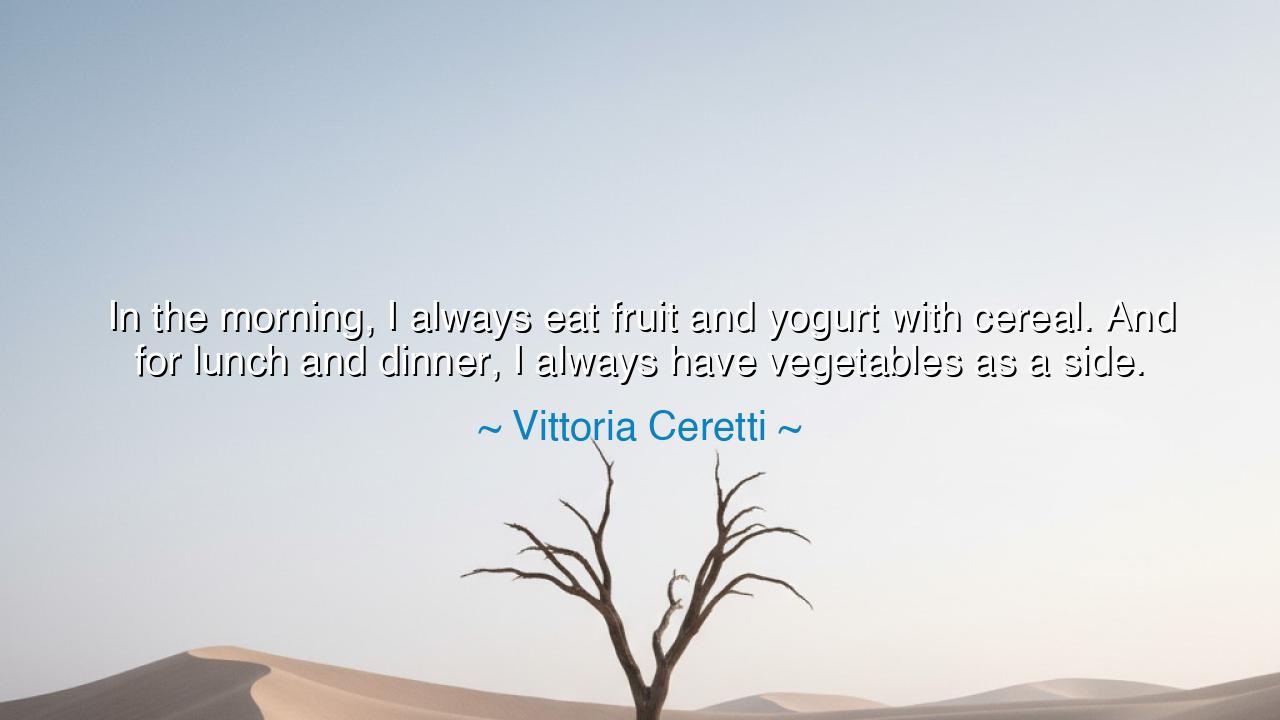
In the morning, I always eat fruit and yogurt with cereal. And
In the morning, I always eat fruit and yogurt with cereal. And for lunch and dinner, I always have vegetables as a side.






Vittoria Ceretti, the model of grace and discipline, once said: “In the morning, I always eat fruit and yogurt with cereal. And for lunch and dinner, I always have vegetables as a side.” At first, her words may sound like the simple rhythm of a daily meal, yet beneath them lies the ancient wisdom of balance, care, and consistency. For what we place into our bodies is not only sustenance for the flesh but also nourishment for the soul.
The morning is the birth of each new day, and how one begins it often sets the course for all that follows. By choosing fruit, with its sweetness born from sun and soil, and yogurt, cultivated by time and patience, Vittoria teaches us the importance of harmony — of freshness and strength, of nature and nurture. Cereal, too, speaks of grains, the staff of life that has sustained civilizations from Egypt to Rome. Her breakfast is not mere habit; it is a symbolic union of earth’s gifts, a ritual of renewal.
Her choice of vegetables for lunch and dinner is not only about health but about humility. Vegetables are the silent guardians of well-being, often overshadowed by meats and delicacies, yet they hold within them the strength of the soil and the wisdom of simplicity. In every leaf of spinach, in every root of carrot, there is the story of survival and growth, drawing power from beneath the earth and offering it to mankind. Vittoria’s words remind us that greatness is often found in the humble, the quiet, the overlooked.
Throughout history, those who sought long life and clarity of mind returned to such wisdom. The ancient philosophers of Greece, like Pythagoras, preached moderation and plant-based simplicity, believing that the harmony of the body was essential for the harmony of the mind. The samurai of Japan, warriors who lived and died by discipline, often ate sparingly of rice, vegetables, and fish, knowing that lightness of body gave sharpness of spirit. In their restraint, as in Vittoria’s meals, lay a key to balance between strength and serenity.
The meaning of her quote is thus not merely nutritional but spiritual: by tending daily to what we eat, we cultivate discipline, patience, and respect for life. It is easy to indulge in chaos, to surrender to fleeting cravings, yet the soul that walks the path of order gains mastery over both flesh and desire. By saying “always,” Vittoria reveals not a rigid prison, but a chosen consistency, a rhythm of care that builds resilience.
The lesson is clear: if you wish to live with energy, clarity, and strength, treat your body as a sacred vessel. Do not feed it with carelessness, but with mindfulness. Choose foods that bring vitality, not just pleasure; choose balance over excess; choose rhythm over disorder. For just as an army marches on its stomach, so too does the spirit depend on the body that carries it.
Practical action flows easily: begin your morning with nourishment that uplifts, not that burdens. Let fresh fruits and whole grains remind you of nature’s generosity. At lunch and dinner, let vegetables be constant companions, steady and reliable. Build rituals around your meals that honor the body and soul alike, and over time, these rituals will grant you strength not only to endure but to flourish.
Thus, Vittoria Ceretti’s words are more than the account of her diet; they are a testament to the ancient truth that daily discipline shapes destiny. Children of tomorrow, remember this: greatness is not built only in moments of triumph, but in the quiet choices made again and again, day after day, meal after meal. Let your food be your ally, your discipline be your guide, and your life will be nourished not only in body, but in spirit everlasting.






AAdministratorAdministrator
Welcome, honored guests. Please leave a comment, we will respond soon